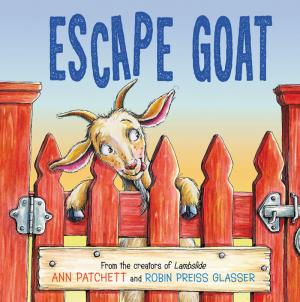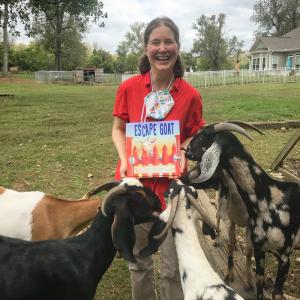Review by Nancy Brannon
Anyone who has ever owned or known goats knows that they can be masters of escape. This book starts innocently enough, with the Farmer family’s goat learning how to escape his enclosure, but things escalate quickly with the goat making his escape an everyday occurrence – in spite of Mr. Farmer steadily increasing the height of the fence!
Pretty soon, all kinds of problems occur – and all are blamed on the goat! But the innocent goat simply wants to explore the world outside his pen. Here’s where the “adult in the room” reading to children will appreciate Patchett’s pun on scapegoat.
Mrs. Farmer’s petunias are trampled; all the cupcakes for Archie’s party disappear; a pie is burned; a whole bucket of paint is spilled, right under where Mrs. Farmer was painting. To top it all, bubble gum was left in a chair for someone else to get stuck with the gooey mess!
Now really, are these the acts of the escape goat, or is he a scapegoat? Thanks to the farmer’s daughter, the goat is found innocent as she proves that everyone else has been blaming the goat instead of admitting to their own mistakes. It’s a delightful way to teach lessons of honesty and taking responsibility for one’s actions.
Ann Patchett’s well written children’s book is beautifully illustrated by Robin Preiss Glasser. The lesson about telling the truth and not blaming others for our actions is well told – for both children and the adults reading to children.
We all know that a scapegoat is one who is blamed for the wrongdoings, mistakes, or faults of others. But do you know its origins? In Leviticus 16, the story of the Day of Atonement, a goat sent into the wilderness after the Jewish chief priest had symbolically laid the sins of the people upon it. According to Merriam-Webster: “The English scapegoat is a compound of the archaic verb scape, which means “escape,” and goat, and is modeled on a misreading of the Hebrew ʽazÄzÄ“l as ʽēz 'ÅzÄ“l, “the goat that departs.”
Author Ann Patchett and Illustrator Robin Preiss Glasser were interviewed by NPR’s Scott Simon on Weekend Edition, Saturday October 17, 2020. Patchett said that when she was a kid, “I thought that the term scapegoat meant if you did something wrong, you blamed a goat.” Once they’ve grown up, everyone knows “a scapegoat is a person who gets blamed for the things that other people do wrong.”
Both Patchett and Glasser are pleased with how well their books resonate with children. The first book they collaborated on was Lambslide. “Who knew that when we were putting this together, books about voting and telling the truth on the farm would be so pertinent?” Patchett wondered.
Glasser related how older kids she had met at a library in Chicago “were really upset with what they’re getting on their computers, with the memes and all the screaming and yelling…and about adults lying right now.” Glasser said the kids “were shocked that the adult, the mom in particular, lies in this story. And we had a great discussion about trust and how if you can’t trust your adults to tell you the truth, everything falls apart. And I realized how very political this story was and I didn’t intend it to be a political story.”
Read/hear the full interview at: https://www.npr.org/2020/10/17/924868645/ann-patchet-robin-preiss-glasser-collaborate-in-childrens-book-about-a-wiley-goa
The book was published in September 2020 and is available at Parnassus Books, Nashville, Tenn., co-owned by the author. It’s also at Novel in Memphis, Tenn., at Square Books in Oxford, Miss., and at Barnes & Noble.
Anyone who has ever owned or known goats knows that they can be masters of escape. This book starts innocently enough, with the Farmer family’s goat learning how to escape his enclosure, but things escalate quickly with the goat making his escape an everyday occurrence – in spite of Mr. Farmer steadily increasing the height of the fence!
Pretty soon, all kinds of problems occur – and all are blamed on the goat! But the innocent goat simply wants to explore the world outside his pen. Here’s where the “adult in the room” reading to children will appreciate Patchett’s pun on scapegoat.
Mrs. Farmer’s petunias are trampled; all the cupcakes for Archie’s party disappear; a pie is burned; a whole bucket of paint is spilled, right under where Mrs. Farmer was painting. To top it all, bubble gum was left in a chair for someone else to get stuck with the gooey mess!
Now really, are these the acts of the escape goat, or is he a scapegoat? Thanks to the farmer’s daughter, the goat is found innocent as she proves that everyone else has been blaming the goat instead of admitting to their own mistakes. It’s a delightful way to teach lessons of honesty and taking responsibility for one’s actions.
Ann Patchett’s well written children’s book is beautifully illustrated by Robin Preiss Glasser. The lesson about telling the truth and not blaming others for our actions is well told – for both children and the adults reading to children.
We all know that a scapegoat is one who is blamed for the wrongdoings, mistakes, or faults of others. But do you know its origins? In Leviticus 16, the story of the Day of Atonement, a goat sent into the wilderness after the Jewish chief priest had symbolically laid the sins of the people upon it. According to Merriam-Webster: “The English scapegoat is a compound of the archaic verb scape, which means “escape,” and goat, and is modeled on a misreading of the Hebrew ʽazÄzÄ“l as ʽēz 'ÅzÄ“l, “the goat that departs.”
Author Ann Patchett and Illustrator Robin Preiss Glasser were interviewed by NPR’s Scott Simon on Weekend Edition, Saturday October 17, 2020. Patchett said that when she was a kid, “I thought that the term scapegoat meant if you did something wrong, you blamed a goat.” Once they’ve grown up, everyone knows “a scapegoat is a person who gets blamed for the things that other people do wrong.”
Both Patchett and Glasser are pleased with how well their books resonate with children. The first book they collaborated on was Lambslide. “Who knew that when we were putting this together, books about voting and telling the truth on the farm would be so pertinent?” Patchett wondered.
Glasser related how older kids she had met at a library in Chicago “were really upset with what they’re getting on their computers, with the memes and all the screaming and yelling…and about adults lying right now.” Glasser said the kids “were shocked that the adult, the mom in particular, lies in this story. And we had a great discussion about trust and how if you can’t trust your adults to tell you the truth, everything falls apart. And I realized how very political this story was and I didn’t intend it to be a political story.”
Read/hear the full interview at: https://www.npr.org/2020/10/17/924868645/ann-patchet-robin-preiss-glasser-collaborate-in-childrens-book-about-a-wiley-goa
The book was published in September 2020 and is available at Parnassus Books, Nashville, Tenn., co-owned by the author. It’s also at Novel in Memphis, Tenn., at Square Books in Oxford, Miss., and at Barnes & Noble.










